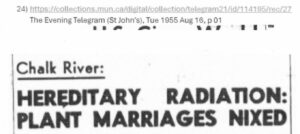
There is increasing concern these days about the validity of what is reported by the news media. The blame is often assigned to a recent decrease in the quality of journalism and on the lack of appropriate fact-checking in social media. The excellent Digital Archives at the Memorial University of Newfoundland (MUN) (https://dai.mun.ca/ ) shows this is not new problem.
The nuclear-related story that caught my eye was one carried by the St. John’s Evening Telegram on Aug 16, 1955. The headline read “Chalk River: Hereditary Radiation: Plant Marriages Nixed”. The story, generated at Geneva Park, ON (site of the Couchiching Conferences) cites a talk on the effects of radiation on genes by Dr. E.W.R. Steacie, president of the National Research Council.
The article begins with “Marriage between workers at Canada’s Chalk River atomic energy plant is discouraged.” It quotes Steacie as saying “radiation damage to genes is a remote possibility” and “every precaution is taken against it, including banning married couples from working at the Plant”.
The article probably received wide coverage and certainly provided interesting reading for staff at Chalk River. The MUN Archives record shows that the following day’s edition of the same newspaper had a new headline which read “Deny Cupid Is Discouraged”. In the article, J.L. Gray, responding to the previous day’s article on behalf of Chalk River, stated “There is absolutely no such attempt made (to prevent such marriages)” and “At present, there are about 50 married couples working on the project.”
Dr. D.A. Keys, scientific advisor to the President of Atomic Energy of Canada Limited, is also quoted as saying he doubts Dr. Steacie made such a statement.
Unfortunately, the journalist who reported on the Steacie talk at the Couchiching Conference is not identified and may no longer be alive. I would have liked to send him a copy of “Memories of the Staff Hotels” which highlights the many marriages that took place between Chalk River employees.
The Canadian Nuclear Heritage Museum has an ever-increasing collection of documents including newspaper clippings, some of them offering critical and/or unique views of the nuclear industry. It welcomes additional contributions from the community. To donate anything of that nature please contact the Museum at info@nuclearheritage.com
